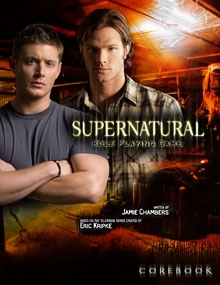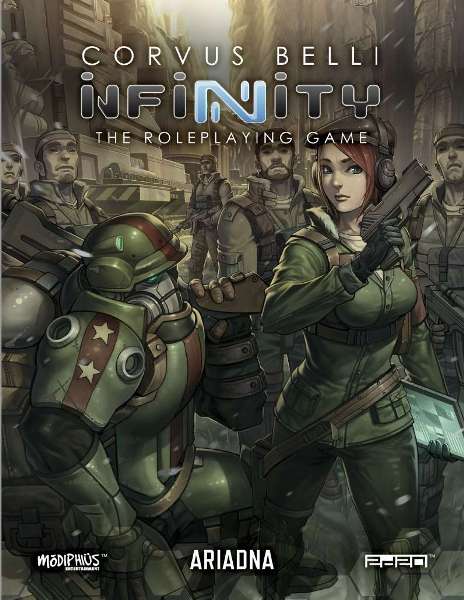Supernatural Role Playing Game
Supernatural Role Playing Game is a complete modern action horror system (powered by the Cortex System) written by Jamie Chambers and published by Margaret Weis Productions.
By The Warden

Using the Cortex System at its foundation, the Supernatural RPG allows a group of die-hard fans the opportunity to play the Winchester brothers, or other hunters, and one other to be the screenwriter/producer/director they’ve always dreamt of within the surreal world of darkness created by the popular TV show. For me, it’s my first full experience with these mechanics and Margaret Weis Productions’ continuing line of licensed games. I’ve seen the show a few times, but never caught it on a regular basis, because I’m a slave to watching everything in order and have yet to find a channel airing it in syndication or a local store selling the first season on DVD.
All that adds up to an eager anticipation on my part to see what all the fuss is about: game mechanics and the setting material alike. The latter is very effective and highly evocative, written as if it were spoken by Dean himself, and sets a clear tone for both those familiar and inexperienced with the show. The former was an acceptable system capable of embracing player participation and character interaction, but seemed rather ho-hum on resolution and combat.
CONTENT
The Supernatural RPG is divided into three sections: Introduction (Chapter 1), Mechanics (Chapters 2-6), and Setting (Chapters 7-9).
Chapter 1: Be Afraid of the Dark sets the tone of the game effectively and does what every intro should: make me want to play or at least email the rest of the lads about it. It offered up enough concepts of the show and its characters (particularly the role of hunters) that you’re not required to know much about the show and even made me more determined to track down that Season 1 DVD.
Chapter 2: The Basics does accomplish something I generally find lacking in most RPGs – explaining the rules before you make your character. In this, a summary of the mechanics are presented without getting into too much detail (enough for a player to understand when creating their own hunter). While the latter Chapter 6 delves into the rules even further, I’ve always found it awkward to learn how to create a character without learning how to use the character. It’s like learning how to drive a car, but I’ll teach you how to use the parking brake after you get your license.
Chapter 3: The Hunters gets into the char-gen aspect, breaking your hunter down to its fundamentals. Everyone has three components to work with: Attributes (natural ability), Skills (stuff you learned) and Traits (habits and quirks about your hunter). Put them all together in a variety of combinations and you’ve got yourself a dice roll. Each of these are assigned dice ranging from d2 to d12 with each type measured according to steps (+1 step means you increase the die by one size, so a d6 becomes a d8). Your action allows you to roll an Attribute + Skill + an appropriate Trait (with Assets possibly adding more dice and a Complication increasing the Difficulty). While Attributes and Skills are fairly standard stuff, Traits are the meat and potatoes of the character development.
Chapter 4: Traits and Skills offers up a list of all those extra features, including Specialty Skills, Assets (including supernatural ones), and Complications.
Chapter 5: The Gear is your equipment chapter, but also offers guidelines for determining how much money your hunters will have over the course of a campaign. The short and sweet of it? You may have to keep up a job while you’re slaying demons.
Chapter 6: The Rules dives into the true definition of the mechanics and how they all work together. All in all, everything’s a fairly standard assortment of difficulty numbers and result levels, combined with an opposed roll combat system with damage resulting from the difference between the successful attack and the lower defense roll. The bulk of the chapter gives a point-by-point list of all the modifiers and possibilities common in your average game. To be honest, it’s all fairly standard stuff you’ll find in nearly every game (though I appreciated the opposed roll combat mechanics as I’ve come to detest locked defense values in RPGs).
If there’s one area the Cortex System excels in, it’s Plot Points. They allow players to grab hold of the story and put in their own twist or boost a dice roll (the number of Plot Points spent determines the die step you can add to the roll). It’s what makes Supernatural more of a story game than other RPGs, though I have to admit it seems a minor difference compared to what I was expecting.
The remaining chapters provide Game Masters with the remaining tools they’ll need to challenge their hunters with mundane and supernatural threats alike.
OVERALL
After reading through the book, I felt as if the Supernatural RPG‘s mechanics were heavily influenced by White Wolf’s World of Darkness games and while I’ve never read Hunter: The Gathering, I’m sure it wouldn’t be too much of a stretch to adapt that game into a homebrew of this show. While the book is well-written and mechanically solid, I have to admit disappointment at what I was expecting. It feels typical to nearly every other RPG out there and while Plot Points are a nice touch, it’s only a fresh coat of paint on a street where all the houses are built the same. If you’ve been waiting for a RPG to come out supporting your favorite show after spending weeks working on a hack from another system, I’d be hard pressed to insist on ditching that work.
This doesn’t mean the game itself is poor, just standard. If you’re new to role-playing, it’s a perfectly acceptable way to enter or continue into the genre. But if you’re experienced and looking for something new and exciting, you might not find it here. I’m in the second category, which is why this game doesn’t quite do it for me in light of what I came to expect.
RATINGS
Publication Quality: 8 out of 10
Every page looks as if it came from one of Winchester’s journals and helps propel the mood of the game and its relation to the show. Very effective in print, a bit of a bother in PDF (my copy came in at 42Mb and was a bit slow to load on the tablet).
Mechanics: 7 out of 10
Functional, yes. Effective, yes. Evocative? No. While Plot Points and Traits were a nice touch, they didn’t make a massive difference to differentiate this game from any other out there.
Desire to Play: 5 out of 10
I’m more psyched about watching the show more than ever and would pull this out if my players squealed when they found out I had a copy. Otherwise, it’s another book to add to the shelf.
Overall: 7 out of 10
Don’t get me wrong, this is a good RPG and demonstrates Margaret Weis Productions as a worthy publisher. Jamie Chambers and the team’s handling of the material is excellent and perhaps if I was already a nut for the show, I’d be more enthusiastic. Yet my personal feeling on the been-there, done-that mechanics is not my cup of tea. Some of my discontent also stems from my expectations of the Cortex System – I don’t think this game lives up to the potential I’ve come to expect from this system. If you’re a fan of the TV show, the rating may be more like 8 out of 10.
You can support Roleplayers Chronicle by using the following links to purchase this book:
Amazon: Supernatural Role Playing Game
Barnes & Noble: Supernatural: Role Playing Game
PDF Download DriveThruRPG: Supernatural Role Playing Game




